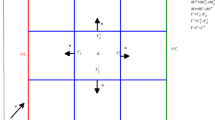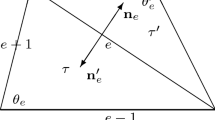Abstract
In this paper, we propose a gradient recovery method for the direct discontinuous Galerkin (DDG) method. A quadratic polynomial is obtain by using the local discrete least-squares fitting to the gradient of numerical solution at certain sampling points. The recovered gradient is defined on a piecewise continuous space, and it may be discontinuous on the whole domain. Based on the recovered gradient, we introduce a posteriori error estimator which takes the \(L^2\) norm of the difference between the direct and post-processed approximations. Some benchmark test problems with typical difficulties are carried out to illustrate the superconvergence of the recovered gradient and validate the asymptotic exactness of the recovery-based a posteriori error estimator. Most of the test problems are from the US National Institute for Standards and Technology (NIST).














Similar content being viewed by others
References
Ainsworth, M., Oden, T.: A posteriori error estimation in finite element analysis. Comput. Methods Appl. Mech. Eng. 142(1–2), 1–88 (1997)
Babuvška, I., Rheinboldt, W.: Error estimates for adaptive finite element computations. SIAM J. Numer. Anal. 15(4), 736–754 (1978)
Babuška, I., Strouboulis, T.: The Finite Element Method and its Reliability. Oxford University Press, Oxford (2001)
Baňas, L., Nürnberg, R.: Adaptive finite element methods for Cahn–Hilliard equations. J. Comput. Appl. Math. 281(1), 2–11 (2008)
Becker, R., Hansbo, P., Larson, M.G.: Energy norm a posteriori error estimation for discontinuous Galerkin methods. Comput. Methods Appl. Mech. Eng. 192(5), 723–733 (2003)
Bernardi, C., Verfürth, R.: Adaptive finite element methods for elliptic equations with non-smooth coefficients. Numer. Math. 85(4), 579–608 (2000)
Cai, Z., Ye, X., Zhang, S.: Discontinuous Galerkin finite element methods for interface problems: a priori and a posteriori error estimations. SIAM J. Numer. Anal. 49(5), 1761–1787 (2011)
Cai, Z., Zhang, S.: Recovery-based error estimator for interface problems: conforming linear elements. SIAM J. Numer. Anal. 47(3), 2132–2156 (2009)
Cai, Z., Zhang, S.: Recovery-based error estimators for interface problems: mixed and nonconforming finite elements. SIAM J. Numer. Anal. 48(1), 30–52 (2010)
Cao, H., Huang, Y., Yi, N.: Adaptive direct discontinuous Galerkin method for elliptic equations. Comput. Math. Appl. 97, 394–415 (2021)
Chen, Z., Dai, S.: On the efficiency of adaptive finite element methods for elliptic problems with discontinuous coefficients. SIAM J. Sci. Comput. 24(2), 443–462 (2002)
Creusé, E., Nicaise, S.: Anisotropic a posteriori error estimation for the mixed discontinuous Galerkin approximation of the stokes problem. Numer. Methods Partial Differ. Equ. 22(2), 449–483 (2006)
Creusé, E., Nicaise, S.: A posteriori error estimator based on gradient recovery by averaging for discontinuous Galerkin methods. J. Comput. Appl. Math. 234(10), 2903–2915 (2010)
Dhondt, S., Nicaise, S.: Equilibrated error estimators for discontinuous Galerkin methods. Numer. Methods Partial Differ. Equ. 24(5), 1236–1252 (2008)
Du, Q., Zhang, J.: Adaptive finite element method for a phase field bending elasticity model of vesicle membrane deformations. SIAM J. Sci. Comput. 30(3), 1634–1657 (2008)
Hansbo, P., Becker, R., Larson, M.: Energy norm a posteriori error estimation for discontinuous Galerkin methods. Comput. Methods Appl. Mech. Eng. 192(5), 723–733 (2003)
Hoppe, R.H.W., Kanschat, G., Warburton, T.: Convergence analysis of an adaptive interior penalty discontinuous Galerkin method. SIAM J. Numer. Anal. 47(1), 534–550 (2008)
Houston, P., Perugia, I., Schötzau, D.: Energy norm a posteriori error estimation for mixed discontinuous Galerkin approximations of the Maxwell operator. Comput. Methods Appl. Mech. Eng. 194(2–5), 499–510 (2005)
Houston, P., Schötzau, D., Wihler, T.: Energy norm a posteriori error estimation of HP-adaptive discontinuous Galerkin methods for elliptic problems. Math. Models Methods Appl. Sci. 17(1), 33–62 (2007)
Huang, H., Chen, Z., Li, J., et al.: Direct discontinuous Galerkin method and its variations for second order elliptic equations. J. Sci. Comput. 70(2), 1–22 (2016)
Karakashian, O., Pascal, F.: A posteriori error estimates for a discontinuous Galerkin approximation of second-order elliptic problems. SIAM J. Numer. Anal. 41(6), 2374–2399 (2003)
Kellogg, R.: On the Poisson equation with intersecting interfaces. Appl. Anal. 4(2), 101–129 (1974)
Lankalapalli, S., Flaherty, J., Shephard, M., Strauss, H.: An adaptive finite element method for magnetohydrodynamics. J. Comput. Phys. 25(1), 363–381 (2007)
Liu, H., Yan, J.: The direct discontinuous Galerkin (DDG) methods for diffusion problems. SIAM J. Numer. Anal. 47(1), 675–698 (2008)
Liu, H., Yan, J.: The direct discontinuous Galerkin (DDG) method for diffusion with interface corrections. Commun. Comput. Phys. 8(3), 541–564 (2010)
Löhner, R.: An adaptive finite element scheme for transient problems in CFD. Comput. Methods Appl. Mech. Eng. 61(3), 323–338 (1987)
Mitchell, F.: A collection of 2D elliptic problems for testing adaptive grid refinement algorithms. Appl. Math. Comput. 220(1), 350–364 (2013)
Petzoldt, M.: A posteriori error estimators for elliptic equations with discontinuous coefficients. Adv. Comput. Math. 16, 47–75 (2002)
Shahbazi, K.: An explicit expression for the penalty parameter of the interior penalty method. J. Comput. Phys. 205(2), 401–407 (2005)
Sun, S., Wheeler, M.: \(L^2(H^1)\) norm a posteriori error estimation for discontinuous Galerkin approximations of reactive transport problems. J. Sci. Comput. 22–23(1), 501–530 (2005)
Vidden, C., Yan, J.: The direct discontinuous Galerkin method with symmetric structure for diffusion problems. J. Comput. Math. 31(6), 638–662 (2013)
Wang, H., Yang, W., Huang, Y.: Adaptive finite element method for the sound wave problems in two kinds of media. Comput. Math. Appl. 79(3), 789–801 (2020)
Wei, H., Huang, Y.: FEALPy: finite element analysis library in Python. Xiangtan University. https://github.com/weihuayi/fealpy (2017–2021)
Yan, J.: A new nonsymmetric discontinuous Galerkin method for time dependent convection diffusion equations. J. Sci. Comput. 54(2–3), 663–683 (2013)
Zienkiewicz, O., Zhu, J.: A simple error estimator and adaptive procedure for practical engineering analysis. Int. J. Numer. Methods Eng. 24(2), 337–357 (1987)
Zienkiewicz, O., Zhu, J.: The superconvergent patch recovery and a posteriori error estimates. Part 1: the recovery technique. Int. J. Numer. Methods Eng. 33(7), 1331–1364 (1992)
Acknowledgements
Cao’s research was supported by Hunan Provincial Innovation Foundation for Postgraduate(CX20200619). Huang’s reserach was partially supported by NSFC Project (11971410) and China’s National Key R &D Programs (2020YFA0713500). Yi’s reserach was partially supported by NSFC Project (12071400), Hunan Provincial NSF Project (2021JJ40189).
Author information
Authors and Affiliations
Corresponding author
Additional information
Publisher's Note
Springer Nature remains neutral with regard to jurisdictional claims in published maps and institutional affiliations.
Rights and permissions
Springer Nature or its licensor (e.g. a society or other partner) holds exclusive rights to this article under a publishing agreement with the author(s) or other rightsholder(s); author self-archiving of the accepted manuscript version of this article is solely governed by the terms of such publishing agreement and applicable law.
About this article
Cite this article
Cao, H., Huang, Y. & Yi, N. Gradient recovery based a posteriori error estimator for the adaptive direct discontinuous Galerkin method. Calcolo 60, 18 (2023). https://doi.org/10.1007/s10092-023-00513-9
Received:
Revised:
Accepted:
Published:
DOI: https://doi.org/10.1007/s10092-023-00513-9




